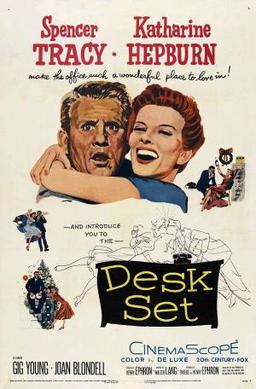Before The Age
of The Internet There Was…Katherine Hepburn and Spencer Tracey’s Desk Set
DVD Review
From The Pen
Of Sam Lowell
Yes, to answer
the question posed by the title of this sketch, before the Internet, before the
whole web of now baffling sets of social networking and media outlets to while
away the hours there was, well, a love story involving computers, and their uses
back in the day, back in the 1950s days when one computer was housed in a whole
room of some dimensions. Hard as it is to believe now that you can get a
million times more information off of your smart phone than the humongous machines
were capable of producing back in the 1950s this whole modern “information
superhighway” superstructure posed certain questions then continue to haunt us
today. That is the subtext to the film under review, Desk Set, the sophisticated romantic comedy starring the famous
Hollywood acting couple Katherine Hepburn and Spencer Tracey.
Ironically the
story line of this film is set in the New York network broadcasting industry at
a time when that medium, when conventional television, was “king of the hill” and
which is now embattled with about six million other ways of getting information
available at the click of a button. But like all business enterprises then and
now, the bottom line was, and is, to get the biggest profits the most effective
and cost-productive way possible. Enter automation, enter the replacement of
the human factor with the efficiencies of the machine. Sound familiar? The way this
one plays out is that Sam (played by Tracey), a crackerjack engineer who helped
create the then first word in computers, was hired by the broadcast company to
streamline its operations with the new machines (then mainly produced when they
were of monstrous size by IBM) and one of the first targets was the research department
headed by crackerjack head researcher Bunny (played by Hepburn and where the
scriptwriters got the name Bunny for the very proper Miss H can only be accounted
for by the old Wasp network of Sunnys, Bunnys, Muffys in horse country places or
at institutions like Bryn Mawr). Thus the battle is joined.
Sam and
Bunny do their dance, the dance around the subtext message at first about the
uses of computers to streamline the research work process which had Bunny and
her co-workers (three very smart women who nevertheless in the 1950s wound up as
clerks in the research department rather than upstairs running things in the executive
suites) worried about their jobs, and rightly so. That worry gets resolved
rather simply when the obvious truth about information machines (then, now it
might be a bit more problematic)-they are only as good as the humans who put
the information in and analyze it meant they would have more work to do rather than less and would
have a higher rate of productivity to satisfy that bottom line. (That same condition
applies today although on a global basis begging the question of who will be
doing that more productive work-some Seven Sisters graduate or some up and
coming smart woman in Mumbai.)
Nice theme
but let’s get back to reality for after all whether using computers or books as
the subtext Hollywood is looking for a romantic resolution to a romantic comedy
and while we can love our modern technology the fate of the computer is not
going to fill seats in a movie theater. But the love triangle pitch certainly
will. Bunny was, well, hung up on this guy, Mike, who was on his way up in the company
but who couldn’t commit to a serious relationship (a serious relationship meaning
one that ended in marriage) until Sam came on the scene and started making
Bunny think twice about her status as Mike’s easy thing, as his dishrag. Naturally
despite all the travails with the computers gumming up the works and the situation
with Mike Bunny and Sam wound up as an “item” of gossip for the water cooler
break crowd. See 1950s Hollywood didn’t let us down.

No comments:
Post a Comment